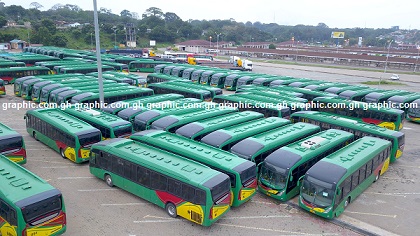
Lack of routes, money for fuel reasons for grounded Aayalolo buses
The lack of designated routes to allow for the free movement of 'Aayalolo ' buses under the Bus Rapid Transport (BRT) system in Accra, is one of the main reasons for the suspension of the bus service, the Ministry of Transport has explained.
More than 170
Related:
Reacting to the development in a radio interview on Accra based Class FM on Monday, the Deputy Minister of Transport, Mr Daniel Titus Glover said there were talks to find a lasting solution to the challenges of Aayalolo.
“The problem of Aayalolo is a challenge to all of us… We realise that all the work that they are doing, they are incurring debt, the running cost of the buses, the payment of remuneration, the management and the drivers have become a big challenge.”
“So currently what the Ministry of Transport did was that we organised a meeting between the board of directors headed by the AMA Chief Executive and the Ministry of Local Government and the Ministry of Transport, then SCANIA, they provided the buses to Aayalolo, we sat down to look at the way forward.”
“So currently what we are trying to do is, first of all we need to raise money to pay for the arrears of the drivers. The buses have to come to the road and we need to raise a minimum of 45,000 litres of fuel and an additional 45,000 as standby so that we will be able to run the buses.”
“As we speak the big challenge of Aayalolo is the lack of designated routes for the passes to pass through,” the Deputy Transport Minister, Titus Glover said.
In a radio interview with Accra based Class FM on Monday, Mr Fred Chidi, the Public Affairs Manager of
“We don’t have money to run the buses, simple and short, because about three weeks ago, we noticed that our revenue target that we projected for the Aayalolo service was not enough, what came in was not enough to run the service.”
“And so after several appeals to the owners of the system, being the government have failed, we decided to shut down the service.”
“Public transport anywhere in the world is heavily subsidised by the state, but unfortunately in our case that is not what happens. And so eventually what happens is whatever revenue that comes in from ticket sales, that is what is used to run the service, administrative cost, overhead and then workers salaries.”
“So it got to a point where we couldn’t take it anymore, whatever was coming in was not enough, and so the prudent decision was to shut down whilst we make an appeal to the owners of the system to resuscitate the service.”
Why no subvention
Mr Chidi said
“We made several interventions to government but nothing was forthcoming. We have some bailout packages, from the suppliers [SCANIA] of the buses which was done intermittently but that was just a drop in the ocean, given the huge financial cost involved in running these buses.”
“Remember the fuel that we put in the buses, we go to the open market just like you buy fuel into your vehicle, there is no subvention, we even made an appeal for some taxes to be waived off fuel but that didn’t come and so running the service was like running any public entity and unfortunately for us we were unable to sustain it.”
“Everything is on the desk of the Ministry of Transport and the AMA Mayor who happens to the chairman of board for GAPTE, that is the regulator for the Aayaolo service, and so there have been several meetings, I’m even coming out of one right now, so there are so many options that are being considered, probably in the next couple of days, you will hear a major announcement about Aayalolo,” Mr Chidi said.
Buses
In all, the government secured 245 buses from the Scania Group of Sweden in 2016 to operate a bus rapid transport (BRT) system.
59 buses were deployed in Greater Accra on the Amasaman - Tudu and Kasoa - Tudu route whilst 60 have sent to Kumasi.
With the exception of six buses that are being used as shuttles between terminals two and three at the Kotoka International Airport in Accra, all the other buses in Accra numbering about 170 have been parked at Achimota terminal in Accra.
Writer's email:
